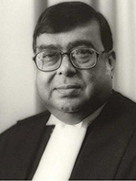
Meet Justice Altamas Kabir and his Notable Judicial decisions
Justice Altamas Kabir (1948–2017) served as the 39th Chief Justice of India from September 29, 2012, to July 18, 2013, capping an eight-year tenure on the Supreme Court. Born in Calcutta, he studied at Calcutta Boys’ School and Presidency College before earning his law degrees from the University of Calcutta. Kabir began his legal practice in 1973, rising through the ranks as a judge of the Calcutta High Court, Chief Justice of the Jharkhand High Court, and ultimately a Supreme Court judge in 2005.
Judicial Career and Philosophy
Justice Kabir was known for his work in criminal law, human rights, bail procedures, and judicial reforms. He authored 362 judgments and sat on 698 benches, often focusing on expanding procedural fairness and access to justice. He was recognized for his empathetic approach, particularly in cases involving marginalized groups and individual liberties.
Landmark Judgments
1. Sandhya Manoj Wankhade v. Manoj Bhimrao Wankhade (2011)
Justice Kabir significantly expanded the scope of the Protection of Women from Domestic Violence Act, 2005. He held that female relatives of a husband could also be prosecuted under the Act, clarifying that women could be perpetrators as well as victims of domestic violence. This interpretation closed a legislative gap, ensuring greater protection for women within families.
2. Prashant Bhushan Contempt Case
In response to allegations by advocate Prashant Bhushan that several former Chief Justices were corrupt, Justice Kabir initiated contempt proceedings, underscoring the judiciary’s commitment to maintaining its institutional dignity. The case highlighted the balance between free speech and the need to protect the judiciary from scandalous attacks.
3. Syed Mohammed Ahmed Kazmi Bail Case (Israeli Embassy Blast, 2012)
Justice Kabir granted statutory bail to journalist Syed Kazmi, accused in the Israeli embassy blast case, after the police failed to file a charge sheet within the stipulated period. He criticized the lower courts for procedural lapses and reinforced the right to bail when due process is not followed, emphasizing the importance of procedural safeguards in criminal justice.
4. Haj Subsidy Case (2012)
Justice Kabir, with Justice Ranjana Desai, ordered the government to phase out the Haj subsidy by 2022, holding that state support for religious pilgrimages was inconsistent with secular principles.
5. Mulayam Singh Yadav Disproportionate Assets Case
As Chief Justice, Kabir directed the CBI to continue its investigation into the disproportionate assets case against Mulayam Singh Yadav and his son Akhilesh Yadav, reinforcing the principle that public officials are accountable under the law.
Legacy
Justice Altamas Kabir is remembered for his contributions to criminal law, procedural justice, and the expansion of legal protections for vulnerable groups. His judgments reflected a commitment to fairness, secularism, and the rule of law, and he played a key role in modernizing court procedures and promoting judicial accountability.












comments